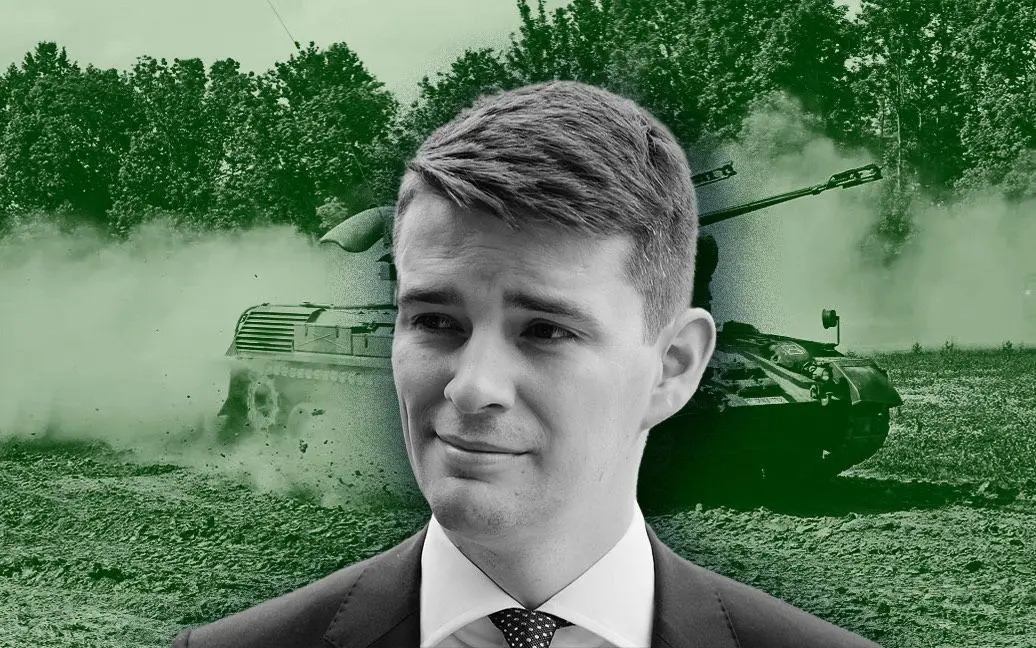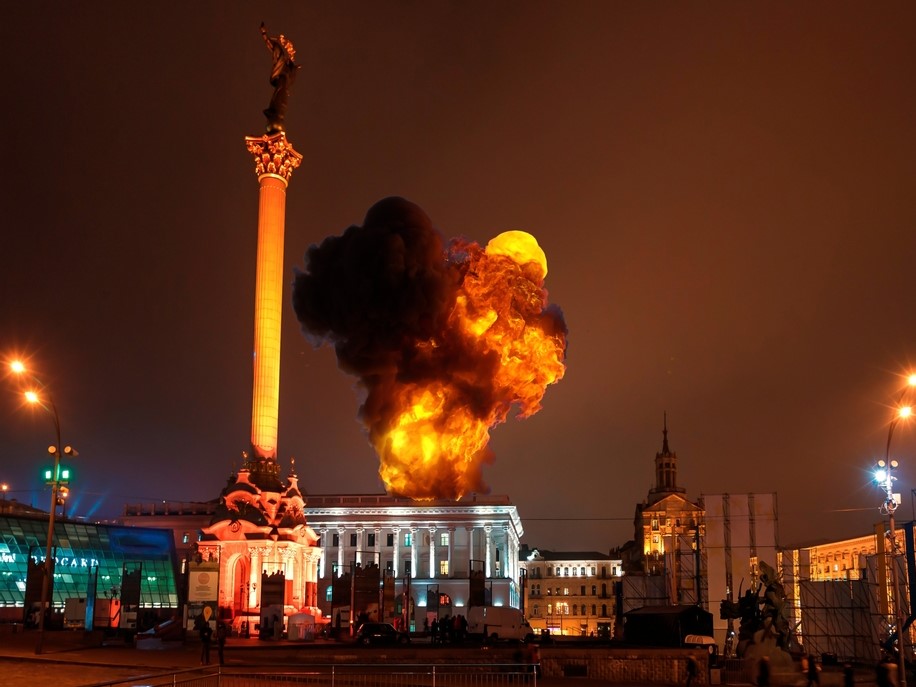
On April 28, the German Bundestag approved a resolution for the supply of heavy weapons to Ukraine.
It seemed that Berlin had finally woken up, realizing who was really the aggressor and who desperately needed help. Germany's first Gepard Tanks and Panzerhaubitzen 2000 finally reached Ukraine. But the decision to supply Ukraine with heavy weapons was not easy for Berlin.
In an interview for TSN.ua, a member of the defense committee of the German Bundestag, Markus Faber, told what other German weapons Ukraine can count on, why there are difficulties with the transfer of air defense systems, and whether Berlin believes in Kyiv's victory.

As a nonprofit journalism organization, we depend on your support to fund coverage of global conflicts. Help us continue funding the hard costs of in-depth coverage of the Ukraine invasion—including travel, hostile environment safety training, and the increased security expenses that arise from reporting in war zones.
- Do you believe that Ukraine can win this war?
- This is quite optimistic scenario. I hope that the Russian offensive in the east can be stopped and already demoralized Russian forces will be then even more demoralized. But the main question is if Ukraine can start a really strong undertake to oppose the Russian formation. So I hope and I’m very convinced that Ukraine won’t lose this war. But I’m not sure about winning. There is a risk of a new front line.
- But discussions in the U.S. and Europe changed. If before and after February 24 everyone was saying that Russians could take Kyiv in 3-4 days, now everyone is talking about defeating Putin on the battlefield. Do you believe in it?
- It is true that Ukrainian forces and defense are very skilled. Their tactics [are] very impressive. But we are talking mostly about the defensive measures and haven’t seen the offensive yet.
- Bundestag adopted a resolution that opens a way for delivering heavy weapons to Ukraine. Just after that, former Russian President Medvedev compared Bundestag with the "Nazis". But that seems like agony. What [does] this resolution [mean] for Ukraine? Because this is just a recommendation to the government, right?
- It’s about a lot of issues. It’s about humanitarian help… But for me the most important point is that there will be no limits for Germany to help, including heavy weapons delivery. So it’s not only about the heavy weapons. We’ve delivered for instance Panzerfaust anti-tank weapons. Now we’ll also deliver tanks. But in Germany especially it was the same. So now we can basically deliver everything that is possible. There are no limitations. We don’t want to be in the war ourselves. We want to be a reliable partner within the NATO. So we can’t just deliver all the tanks to Ukraine because we have no tanks left. But what we can do we’ll necessarily do now.
- You said that Germany don’t want to be involved in this war. But German society is widely discussing the risk of WWIII and even Russia's use of tactical nuclear weapons. What are the discussions in Bundestag about it?
- They are the same as in the German society. Some people are very worried about something like a nuclear war. Actually I don’t see any risks for Germany to become a part of this war. I don’t think that this can happen, for example, because of our decision to supply tanks to Ukraine, as Slovenia, Slovakia or the Czech Republic do. So if they are not still in the war why should we be? But there will be an escalation that comes to the economic dimension. Bulgaria and Poland don’t receive Russian gas anymore. And these measures can happen also with Germany. But I don’t see that [Germany] will be a part of this war. But the discussions are there because a lot of people haven’t been very much involved in defense policy. There are more than 700 members in our parliament. But just 38 of them are in the Defense Committee. Others care for something else like healthcare, education… Therefore, due to the lack of information and involvement of German society and politicians, people are mostly scared.
- For me actually it was a great surprise that Germany was so quick to support the oil embargo…
- I think it is possible to have both coal and oil embargo within this year. Because we have to build another supply chain for oil and coal. I discussed it with my colleagues among the parliamentary group; they’ve said the same, that it is possible this year. But not now. And when it comes to gas this is [a] more difficult question because there is no other supply chain. At least not this year. We have no infrastructure for it. But when it comes to oil and coal it’s possible.
- Perhaps you have already discussed in the Bundestag what Germany will do if Putin simply closes the gas valve one day?
- We have some reserves. Therefore, we can continue to supply gas to consumers for several months after that happens. Especially in summer time. But it will be a big problem for us in the winter. We have discussions right now about LNG-terminals to deliver liquefied gas. Of course we can deliver liquefied gas but not to the extent we need.
- But probably here in Bundestag you already have some calculations on the possible losses for [the] German economy after the cessation of supplies of Russian gas?
- You know, actually I’m not sure that somebody even has these numbers. There are big speculations on this issue. So how much of the gas supply would be cut off? How can it be replaced? And is it possible also for the private sector to reduce gas consumption especially in the winter time to have more for the industry? And some industry infrastructure, if it is disconnected from the gas, [will] be simply destroyed. You can't just turn it off and then on again. So it’s very hard to calculate the amount of possible loses for [the] German economy.
- Ok. Let’s move to the German policy towards Russia recent years. Was it a mistake?
- Yes, it was a mistake. But this was not exclusively German policy. We have different parliamentary groups and parties, especially the Social Democratic Party. But also I’d say Chancellor Merkel had a wrong perspective on the Russian regime. I never understood it actually. But this was the case. For me it wasn’t a surprise when Putin’s regime started a full scale war against Ukraine, because it had done the same before but without such an escalation. Putin occupied Crimea and invaded of the eastern Ukraine. Before that he did the same in Georgia, Moldova and Chechenia. And let’s [not] forget about the intervention in Syria. And it’s the common thing for his regime to use military force to implement his political will. So, again, it wasn’t a surprise for me. But the scale was a surprise. And some people just ignored the way this regime was doing politics. Now we understand this, but unfortunately it is too late.
- If Ukraine falls in this war do you believe that Putin won’t stop and will go further? Who knows who can be Putin’s [next] victim. It can be Sweden or Finland which just have declared their aspirations to join NATO. Or Poland and Baltic states.
- A lot of Russian military supplies [are] destroyed by now. And the war is still going on. And because Ukraine is doing it so good, the capability of Russia to attack other countries is declining every day. But of course when this war ends in anyway the Russian regime will need 3-5 years or more (I don’t know) to rebuild their army and forces. And only after this I’m sure they will want to invade other countries or Ukraine again. But for instance Finland. That’s why I think Sweden and Finland want to be a part of NATO so fast. Because I think NATO will not be attacked. It’s just too strong. But every other country which is a neighbor of Russia is in danger.
- When the attempt to seize Kyiv failed, Putin focused on Donbas and the south, trying to seize a large part of Ukrainian territory from Kharkiv to even Transnistria. How do you assess the possibility of the Russian success in so called this phase two?
- I think this will not be successful. If they build such a corridor, then frontline will be like 700-800 km. This is a very long front line to be able to hold. Also people will continue to resist this Russian occupation. So it won’t be sustainable to maintain this corridor for too long. Yes, it is a threat. But especially Odessa is impossible for Russians to control to have this bridge to Transnistria. What is possible from my point of view, if everything goes wrong, that Russians capture completely Luhansk and Donetsk region and maintain a bridge to Crimea. I hope that the ability of the Ukrainian armed forces to resist won’t diminish. But from the Russian perspective they are trying to divide Ukraine by the Dnipro river.
- That is, to divide Ukraine into the two parts along the Dnipro?
- It’s easier to control the frontline then. But again Ukrainians who remain to live in these occupied territories will continue to resist. So it’ll be very hard for the Russians to maintain this occupation for several years.
- If you were the Minister of Defense of Germany, what additional weapons would you supply to Ukraine? What is Ukraine lacking now?
- Artillery. A lot of artillery. That’s what some other countries, for example Canada and the U.S., right now are delivering to Ukraine. We should do the same. For instance the Netherlands said that they deliver Panzerhubitze 2000 self-propelled howitzer systems to Ukraine. Germany will deliver the ammunition for it as well as provide training for the Ukrainian forces to use these weapons. We are also delivering Gepards. But the most important is artillery and air defense systems.
- You’ve just mentioned the air defense systems. Ukraine needs them very much. But as far as I know, there are not many of them in Europe.
- That’s true. Ukraine always asks to close the sky. But the discussion always was about that NATO forces should introduce a no-fly zone and basically shoot down Russian airplanes. It’s impossible.
- Why? The Third World War?
- Yes. Because of that NATO forces can’t take part in this. But delivering the air defense systems is something else. It’s easier to train people to use them and hand them over to Ukrainians so that they provide a no-fly zone and protect the sky from the Russian fighters and missiles by themselves. Despite the fact that they are expensive, and learning to use them will take months, if not years. But nevertheless it’s easier for us to hand them over to the Ukrainians.
- Ok. You say that it’s easier to teach Ukrainians to use them. But it’ll be German systems?
- We in Germany have 12 Patriot systems. And all of them [basically] carry a defensive duty. And they are not so updated. It’s not so difficult to destroy them because they have just 120-degree corridor where they can defend what’s incoming. And Russia knows it. So it’s easy to launch a cruise missile that comes from behind and just destroys them. So we have to deliver the new ones with 360-degree. And there are more modern systems that German companies are also delivering to other countries. And I think it’s a way that is worth discussing. If other countries that already have the standing contracts with those companies can agree that their systems will be delivered to them later, instead their systems will now arrive in Ukraine.
- Can it be Poland for example? Because as we know they are waiting for the Patriots next year?
- No.
- Because Poland and some other countries on the NATO's eastern flank don’t even have them.
- That’s true. As for the Germany for example all the Patriot systems are able to protect Berlin but not all of Germany.
- How long do you think the war will last?
- It’s very hard to predict something right now. I think the Russian offensive will be stopped in some point. And then the question is if Putin regime say that it’s the best they can do and go to reasonable peace talks. And after that will the Ukrainian side to enter these talks as well. Or Ukrainians will say: ok, we have to keep and continue this offensive. I think the Ukrainian side will want to knock them out and go on the offensive. So when the Russians are ready to negotiate I think Ukraine won’t. Because if I were Ukrainians, I wouldn’t also want to enter any negotiations with Russia. If you negotiate now under this conditions, you simply stop the fighting but don’t establish peace. And who guarantees that the same won’t happen in for example five years. So, if I were Ukraine, I would fight on.
- But Russian missiles are still flying. What can and should we do to stop them? How more of these missiles Russia still has? Because you know it’s simply impossible to close the whole Ukraine with for example Patriots. We need a lot of them. So we just have to wait until these missiles run out in Russia?
- How many missiles are left in Russia is secret information from our defense committee. So I can't tell you that. But on both sides the number of missiles that are left [are] obviously declining. And they are declining much faster by the Ukrainian not the Russian side. But on both sides they are declining. And they can’t be built as fast as they are launching. Ukraine [doesn't] have to think just about Patriot systems. There are a lot of others as well that provide very professional air defense. I hope that some reasonable air defense systems will be delivered to Ukraine by Germany or others. But I think probably not the Patriot one.
- S-300?
- For instance. But German as well as other world companies produce other systems. I don’t want to mention them. But there are other systems that are very capable to at least provide air defense for certain range. And from my point of view I’d put it somewhere, let’s say 10-20 miles, behind the Ukrainian defense so the frontline can’t be attacked by Russian missiles. So this is the way to put it. So it’s about the protection for the forces on the frontline. But we don’t talk about the protection all of Ukraine.
- So we can avoid the second Mariupol, right?
- Yes, hopefully.
- What do you think about Mariupol actually? Can we unblock it?
- I think the situation there is a disaster. I’d be very happy if you can. But right now I don’t see the way out. It’s just too far for Ukrainian forces.
- Because they control the sky?
- They control the sky and they also have many forces on the ground. So even if Ukraine aims any serious counterattack to unblock Mariupol it’s very far. It’s from 80 to 100 km. Even if you start a serious tank attack supported by the artillery you can’t manage it for too long without supplies and reinforcements, because Russians can [cut them off].
- Did Germany make a mistake at the 2008 NATO Bucharest Summit by blocking Ukraine's receiving a MAP?
- I was already in politics in 2008, but not in the German Bundestag. I think by then the idea was not to escalate the possible conflict with Russia. But right now the conflict as escalated as it can be. Of course we say yes maybe NATO was to sensible. But from the todays perspective I think it was a mistake. But then in 2008 it was a big difference.
- Doesn’t the time come to fix this mistake?
- NATO will never adopt a membership of a country that has an ongoing conflict. That’s why Putin still has forces in Georgia for instance and wants the war against Ukraine to be continued. So even if the fighting stops his aim will be that there is no final resolution for Ukraine.
- It turns out that Sweden and Finland are also at risk. And until the actual accession to NATO someone has to guarantee their security.
- That’s true. That is why they are in such a hurry while Russia is busy with the war against Ukraine. So the final perspective is that they won’t invade Finland at the same time. That is why they now have the opportunity to join NATO.






